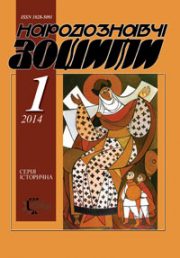The Ethnology Notebooks. 2023. № 2 (170), 459—463
UDK811.161.2’282(477.65)
DOI https://doi.org/10.15407/nz2023.02.459
DIALECTISMS OF ROZNOSHENSKE AND VELYKI TROIANY VILLAGES KIROVOHRAD REGION, HOLOVANIVSK DISTRICT
BABENKO-ZHYRNOVA Maryna
- ORCID ID: https://orcid.org/0000-0002-1886-1234
- Ph.D., docent, Kyiv Cooperative Institute of Business and Law,
- Lomonosova Street, 18, 03022, Кyiv, Ukraine,
- Contacts: e-mail: Marina_Vitaliivna@ukr.net
KONDRATIUK Yevhen
- ORCID ID: https://orcid.org/0000-0003-2010-8601
- Student of first course major of
- «English language and Anglophone cultures»,
- The University of Preshov, The faculty of Philosophy,
- 17, November Street, 15, Preshov, Slovakia,
- Contacts: e-mail: 13evgen.kondratiuk13@gmail.com
Abstract. The article is dedicated to analysis of the regional language Roznoshenske and Velyki Troiany villages of the Kirovohrad region, Holovanivsk district. The study of the linguistic features of each region proves the relevance of local studies of dialects of certain villages and towns. Such work is needed for further in-depth studies, systematization of knowledge, and compilation of linguistic atlases for a certain area.
So, the purpose of this work is to clarify the lexical features of the speech of Roznoshenske village and Velyki Troyany village of Golovaniv district of Kirovohrad region. The subject of the study is the lexical and morphological peculiarities of the functioning of dialectics, particularly, the dialect of the two above-mentioned villages is the object of the study.
Materials for the study were collected during communication with the old residents of the villages, during visits to various ethnographic events in the above-mentioned villages. The relevance of the research is determined by the insufficient study of this issue, the need for a thorough analysis within a certain dialect at the regional level.
The methodological basis of the research is a descriptive method with a combination of synchronic and diachronic aspects.
Dialectic words of this land are fascinating because they combine some features of the steppes dialectic, within the Southeastern regional language, and Podolsky dialectic, within the southwestern dialect. The article traces the historical context of formation of the local dialect. Moreover, the thematic groups of dialectic words are highlighted: household vocabulary; flora and fauna; professions and craft; popular holidays, habits, rituals; phraseological dialectic words. Comparing the dialects of different villages of the studied region allows us to trace the various historical paths of certain lexemes, which can have completely different meanings depending on the area of use. Research is also focused on the phonetic and orthographic features of the regional language of the above-mentioned villages. Dialectic words of Kirovohrad region have own history of investigation, albeit, there are still a lot of topics for new studies. The analyzed material reveals to the public a little-known region of Ukraine, where, despite the futile efforts of the politic of russification, an authentic linguistic flavor has been preserved.
Keywords: dialectic words, dialect, regional language, lexeme, idioms.
Received 11.03.2023
REFERENCES
- Berezovs’ka, H. (2012). East Podil dialects in the context of the Podil dialect. Philological Bulletin of the Uman State Pedagogical University P. Tychyny (Issue 3, pp. 8—14) [in Ukrainian].
- Viktorina, O. (2010). Materials for the phraseological dictionary of Kirovohrad Region (phytophraseology). Scientific notes, philological series (Issue 89, part 3, pp. 31—36) [in Ukrainian].
- Viktorina, O. (2010). Materials for the phraseological dictionary of Kirovohrad Region (somatic phraseology) (Issue 11, pp. 59—66). Kirovohrad [in Ukrainian].
- Viktorina, O. (2006). Dictionary of lexica and phraseology of traditional medicine and healing magic of Kirovohrad region. Kirovohrad [in Ukrainian].
- Hromko, T., Luchyk, V., & Poliarush, T. (1999). Dictionary of traditional geographic terms of Kirovohrad region. Kirovohrad [in Ukrainian].
- Zadorozhna, N. (2012). Lexical dialectics of one dialect of the Sinyuho-Buzky interfluve. Scientific notes, philological series, 105 (1), 46—52[in Ukrainian].
- Martynova, H. (2011). Eastern Middle Transdnieper dialects: to the problem of classification. Scientific notes, philological series, 100, 460—464[in Ukrainian].
- Romanchenko, A. (2016). Govirka village of Bandurove, Hayvoron district, Kirovohrad region. Notes on Ukrainian Linguistics. Retrieved from: http://nbuv.gov.ua/UJRN/zukm_2016_23_12 [in Ukrainian].





